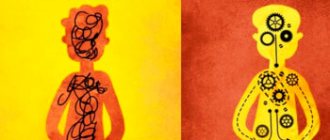Man has a unique ability to capture and produce speech; remember information and process it. Disorders of these functions may be associated with mental disorders. It may be temporary or permanent. Most often, a malfunction of the brain causes a stroke, which is a consequence of a disruption in the supply of blood to an area of the brain. A stroke is a medical emergency and prompt treatment is essential because the sooner treatment is started, the less damage to the brain there will be .
According to the WHO (World Health Organization), about 15 million people annually experience this disease, of these 15 million, 5 million die, and another 5 million are completely immobilized. About 12 million strokes are caused by high blood pressure. According to statistics, stroke is the fourth most fatal disease in the world. Stroke is the leading cause of disability, and 75% of patients are over the age of 65.
Only timely diagnosis and proper treatment will allow brain function to be restored. The first step to solving this problem is choosing the right clinic.
Main symptoms and dangers
Memory impairment
Memory impairment refers to the inability to store and correctly process information. A person may stop remembering important dates, events, faces of loved ones and stop finding his way in a familiar space. This phenomenon can be either short-term or permanent. At the first symptoms, you need to contact an experienced neurologist, because otherwise, the neurological disorder can develop into a chronic form and negatively affect the quality of life.
Attention disorder
Attention refers to the ability of an individual to focus on certain factors. Several symptoms indicate a violation of this function:
· The person becomes distracted. He gets tired quickly and for a long time cannot penetrate into the essence of the task at hand.
· Attention quickly switches from one object to another or, conversely, a person is unable to switch his attention for a long time.
The most dangerous consequence of this condition is a complete lack of concentration, in which a person loses the ability to adequately perceive and grasp information.
Thinking disorder
Thinking refers to the brain's ability to process information. The most obvious signs of a violation are:
· incoherent and jerky speech;
· loss of orientation in space;
· reduced level of thinking.
The negative consequence is that a person cannot exist independently in society without the support of other people.
If primary symptoms of impaired memory, thinking and attention appear, you should consult a neurologist. It will help to identify the cause of the deviation and select a set of rehabilitation measures aimed at restoring important functions.
There are cases of simultaneous impairment of memory, thinking and attention. This is a very dangerous symptom that can become a harbinger of cerebrovascular accident, and therefore it is recommended to pay close attention to your health. If primary symptoms of a neurological disorder appear, you should consult an experienced specialist.
What are the reasons for this problem?
In most cases, a disorder of human thinking processes occurs due to biological pathologies and disorders. They provoke lesions of the brain substrate of various types. Moderate or mild forms of the disorder can be triggered by individual characteristics in the formation of reactions to stress and other traumatic situations that arise in life. Among the most common causes of thought disorder syndrome are:
- biochemical changes occurring in brain cells;
- TBI;
- psychoses;
- degenerative pathologies of the central nervous system;
- epilepsy;
- inflammatory processes of the central nervous system;
- malignant and benign neoplasms formed in the brain;
- neuroses, stress.
Diagnostic measures
Not a single process in the human body occurs suddenly. Any illness is given a “impetus” by a certain factor. That is why the first stage of working with a client is to identify the cause of the disorder.
If the appearance of the disease is a secondary form of the development of another disease, then in this case, general tests and instrumental examination are used.
Possible causes of violations
| memory | attention | thinking |
| stress | Long-term depression | mental retardation |
| overwork | epilepsy | epilepsy |
| hypovitaminosis | phobia | encephalitis |
| alcoholism | schizophrenia | Traumatic brain injury |
| Cerebral circulatory disorders | mental retardation | stress |
| Traumatic brain injuries | cerebral atherosclerosis | alcoholism |
| Congenital mental retardation | Vitamin deficiency | overwork |
| Alzheimer's disease | Infectious diseases | Cerebral circulatory disorders |
| Consequences of difficult pregnancy and childbirth | Intoxication of the body | hypovitaminosis |
In all cases, neurological deviation can be either temporary or permanent.
How do specialists work?
Our clinic employs experienced specialists who know how to effectively approach solving these problems. The patient is given training, after which memory, attention and thinking are strengthened. Modern tests focus on word repetition; drawing up a single picture from several abstract concepts; text analysis; solving problems using ingenuity.
If necessary, specialists will select a complex of vitamins and medications necessary to eliminate the problem, which are selected individually, depending on the cause and stage of manifestation of the disorders.
The goal of our specialists is to develop a set of measures to restore vital functions. We strive to completely change the patient’s lifestyle, making it the most favorable for recovery.
Impaired thinking in mental illness
I. Disturbances in the dynamics of thinking.
1. Acceleration of thinking (“leap of ideas”) Conventionally, more associations are formed per unit of time than normal, and at the same time their quality suffers. Images, ideas, judgments, and conclusions that quickly replace each other are extremely superficial. The abundance of ease of new associations that spontaneously arise from any stimulus is reflected in speech production, which may resemble the so-called. machine gun speech. From continuous talking, patients sometimes lose their voice, or it becomes hoarse and whispery. In general, acceleration of thinking is an obligatory derivative of manic syndrome of various origins (affective disorders, schizophrenia, drug addiction, etc.) Jump of ideas (fuga idearum). This is an extreme acceleration of thinking: the thought process and speech production continuously flows and jumps; they are incoherent. However, if this speech is recorded on a tape recorder and played back at a slow pace, it is possible to determine some meaning in it, which never happens with true incoherent thinking. The basis of the race of ideas is the increased lability of cortical processes.
Characteristic:
- Quick associations, increased distractibility, expressive gestures and facial expressions.
- Analysis, synthesis, and understanding of the situation are not impaired.
- They don’t think much about the answer.
- Errors are easily corrected if pointed out.
- Associations are chaotic, random, and uninhibited.
- The generalized meaning of the task is accessible; he can perform it at this level if he is not distracted.
2. Inertia of thinking Manifestations: inhibition, poverty of associations. The slowdown in the associative process is most pronounced in an absolutely “empty head, in which thoughts do not appear at all.” Patients answer questions in monosyllables and after a long pause (the latent period of speech reactions increases compared to the norm by 7-10 times). The general goal of the thought process is preserved, but switching to new goals is extremely difficult. Such a disorder is usually characteristic of epilepsy (“primary disorder”), epileptoid psychopathy, manic-depressive syndrome, but can be observed in apathetic and asthenic conditions, as well as in mild degrees of clouding of consciousness. Patients can change the way they work, change their judgment, or switch to another type of activity. Characterized by slowness, stiffness, and poor switchability. The solution to a problem is available if it is performed in only one specific way. The inertia of connections from past experience leads to a decrease in the level of generalization.
3. Inconsistency of judgment Unsustainable way of completing a task. The level of generalization has not been reduced. Analysis, synthesis, and assimilation of instructions are intact. Understand the figurative meaning of proverbs and metaphors. The adequate nature of judgments is unstable. Alternate between the correct and incorrect way to complete a task. 81% vascular diseases 68% trauma 66% MDP 14% schizophrenia (in remission) With an unexpressed degree of the disease, such inconsistency of judgment can be corrected. Often it is enough to attract attention for the patient to correct himself. Oscillations occur at the slightest change in task conditions.
4. “Responsiveness” In patients suffering from severe vascular diseases. The instability of the method of performing a task and the associated fluctuations in mental achievements acquire a grotesque character. Example: after completing the classification, the patient suddenly begins to treat the pictures as real objects: he tries to put the card with a ship, because if you put it down, it will drown. Such patients may not be oriented in place and time. They are not critical of their condition. They don’t remember the names of loved ones, significant dates, or the name of the doctor. Speech is impaired and may be incoherent. The behavior is often ridiculous. There are no spontaneous statements. These violations are dynamic. Over a short period of time, the nature of the patients’ judgments and actions fluctuates. Characterized by increased responsiveness to a variety of environmental stimuli that are not addressed to them. Sometimes environmental objects are woven into speech. A forced tendency is created to reflect in speech, without selection, everything that is perceived. Rapid response to external random stimuli is combined with poor switching ability. In earlier works, the phenomenon of responsiveness was described as field behavior.
It is necessary to distinguish between responsiveness and distractibility (in children). They have different genesis:
- responsiveness is a consequence of a decrease in the level of cortical activity; contributes to the destruction of purposeful activity.
- distractibility is a consequence of an enhanced orientation reflex and high activity of the cortex.
The formation of a large number of temporary connections is the basis for further purposeful activity.
5. Slipping Correctly solving any task and adequately reasoning about any subject, patients suddenly stray from the correct train of thought due to a false, inadequate association, and then are again able to continue reasoning consistently, without repeating the error, but without correcting it. Typical for fairly intact patients with schizophrenia. Slips are sudden and episodic. In an associative experiment, random associations and associations based on consonance (woe-sea) often appear. The process of generalization and abstraction is not disrupted. They can correctly synthesize material and correctly identify essential features. At the same time, for a certain period of time, the correct course of thinking is disrupted due to the fact that patients in their judgments begin to be guided by random, unimportant signs in a given situation.
II. Violations of the operational side of thinking in mental illness.
1. Reduced level of generalization In the judgments of patients, direct ideas about objects and phenomena dominate; Operating with general features is replaced by establishing specific connections between objects. They cannot select the features that most fully reveal the concept. 95% oligophrenia 86% epilepsy 70% encephalitis
2. Distortion of the generalization process. They reflect only the random side of phenomena, the essential relationships between objects are little taken into account; the substantive content of things and phenomena is not taken into account. More common in patients with schizophrenia (67%) and psychopaths (33%). The disruption of the generalization process is caused by the fact that patients are not guided by culturally accepted relationships between objects. So, in the problem, the fourth-too-man can combine a table, a bed and a closet, calling them volumes limited by wooden planes.
III. Disturbances in the motivational component of thinking.
1. Diversity of thinking - patients’ judgments about any phenomena occur on different planes. Patients do not complete tasks, although they assimilate instructions; their mental operations of comparison, discrimination, generalization, and distraction are intact. The patient's actions lack purposefulness. Diversity appears especially clearly in tasks on classifying objects and eliminating objects.
2. Reasoning - “a tendency to fruitless philosophizing”, “verbal tumor” (I.P. Pavlov). Speech is replete with complex logical constructions, fanciful abstract concepts, and terms that are often used without understanding their true meaning. If a patient with thoroughness strives to answer the doctor’s question as fully as possible, then for patients with reasoning it does not matter whether their interlocutor understood. They are interested in the process of thinking itself, and not the final thought. Thinking becomes amorphous, devoid of clear content. When discussing simple everyday issues, patients find it difficult to accurately formulate the subject of the conversation, express themselves in florid ways, and consider problems from the point of view of the most abstract sciences (philosophy, ethics, cosmology). Such a penchant for lengthy, fruitless philosophical reasoning is often combined with absurd abstract hobbies (metaphysical intoxication). Psychological research. Thus, from the point of view of psychiatrists, reasoning is a pathology of thinking itself, however, psychological studies (T.I. Tepenitsyna) have shown that these are violations not so much of intellectual operations, but of the personality as a whole (increased affectivity, inadequate attitude, the desire to let anyone down). , even the most insignificant phenomenon under some “concept”). Research has shown that the inadequacy, reasoning of patients, and their verbosity appeared in cases where there was affective preoccupation, an excessive narrowing of the circle of meaning-forming motives, and an increased tendency to “value judgments.” Affectivity is also manifested in the very form of the statement: meaningful, with inappropriate pathos. Sometimes only the intonation of the subject allows us to regard the statement as reasonable (that’s why what is described in textbooks looks so faded - there is no emotionality in intonations). Types of reasoning for various mental pathologies:
- Schizophrenic (classical) reasoning.
- Epileptic reasoning
- Organic reasoning
3. Violation of criticality. Loss of focus of thinking, superficiality, incompleteness of thinking; thinking ceases to be a regulator of human actions. S.L. Rubinstein: only in the process of thinking, in which the subject more or less consciously correlates the results of the thought process with objective data, is an error possible and that “the opportunity to realize an error is the privilege of thought.” In psychopathology, criticality is a critical attitude towards delusions, hallucinations, and other painful experiences. For Zeigarnik: criticality is the ability to act thoughtfully, check and correct one’s actions in accordance with objective conditions.
4. Associative thinking. A rare phenomenon that occurs with damage to the frontal lobes of the brain and deep schizophrenia, which has led to a complete collapse of the motivational sphere. It is characterized by the fact that thinking is determined by the laws of associations.








